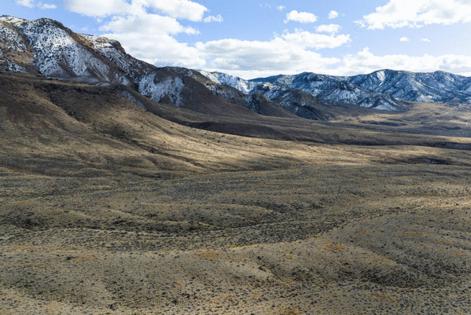Biden administration gives final OK to Nevada lithium-boron mine. Environmentalists plan to sue
Published in News & Features
An Australian mining company’s lithium-boron mine in Nevada passed all environmental hurdles on Thursday, and an environmental group immediately notified the federal government that it plans to sue.
In a letter to Interior Department officials, the Center for Biological Diversity announced its intention to file a lawsuit, calling the mine an unacceptable threat to an endangered wildflower known as Tiehm’s buckwheat. The organization’s successful campaign for an emergency listing under the Endangered Species Act greatly shifted the mine’s plan of operations, with more accommodations made for the plant.
Thursday’s decision marks the Biden administration’s first approval of a lithium mine to date. The mine, which the company says will produce enough lithium to power 370,000 electric vehicles a year, will be the only one in the world to produce both lithium and boron at the same time on a large scale. It will create 500 construction jobs and 300 jobs once the mine is operational.
“This really is a one-of-a-kind type project,” Ioneer CEO Bernard Rowe told reporters in a press briefing. “It’s that unique mineralogy, that combination of lithium and boron, that really sets it apart.”
Rhyolite Ridge, as the remote mountain ridge in Esmeralda County is called, is only miles away from the country’s only functional lithium mine at Silver Peak, owned by Albemarle. Ioneer’s project joins Lithium America’s Thacker Pass, near the Nevada-Oregon border, as the third fully permitted lithium mine in the country — all in the Silver State.
Nevada’s lithium legacy
Thursday’s announcement further solidifies Nevada as a leader for so-called “critical minerals,” or those that the federal government deems in short supply. Biden administration officials have linked certain mining projects to the push for more sources of green energy, such as lithium for electric vehicle batteries.
There’s been support from across the political isle as well, with Republican Gov. Joe Lombardo hosting Nevada’s first lithium summit in Reno in September. His office didn’t respond to a request for comment about the Ioneer announcement.
U.S. Sen. Catherine Cortez Masto, D-Nev., wrote on X that the Rhyolite Ridge project is a good example of how the country can wean itself off of its dependence on China, which supplies 80% of the world’s battery cells and accounts for about 60% of the global EV market.
“The fact is, we can’t keep relying on the Communist Party of China for the critical minerals we need for our military and economy,” Cortez Masto wrote. “We need to bring these jobs home and tackle climate change. We can and must do both.”
In a statement to the Las Vegas Review-Journal, Nevada Mining Association President Amanda Hilton praised Ioneer for its “commitment to responsible development” and called the approval “a significant step forward” for Nevada’s role in producing a domestic supply of lithium.
The federal government has signaled its support for lithium development in Nevada on multiple occasions, particularly with the $700 million conditional loan the Department of Energy awarded to Ioneer for the project.
“We have moved quickly to build a robust and sustainable clean energy economy that will create jobs to support families, boost local economies, and help address environmental injustice,” Acting Deputy Interior Secretary Laura Daniel-Davis said in a statement. “The Rhyolite Ridge lithium mine project is essential to advancing the clean energy transition and powering the economy of the future.”
Wildflower fight may reach the courtroom
But the speed federal officials say is needed to diversify the country’s energy portfolio and address climate change doesn’t come without sacrifice.
A lawsuit hinged on the Endangered Species Act — the federal law that obligates the government to protect plants and animals at risk of extinction — could be forthcoming.
“(The Bureau of Land Management) has consistently prioritized aspects of its multiple use mission, particularly the expedited authorization of Ioneer’s exploration and mine development proposals, at the expense of Tiehm’s buckwheat,” Center for Biological Diversity attorneys wrote in its letter to federal officials.
Ioneer executives told the Las Vegas Review-Journal that they do not anticipate a lawsuit to delay construction that is set to begin in 2025.
As a part of the environmental permitting process, the U.S. Fish and Wildlife Service issued a formal opinion that the mine is “not likely to jeopardize the continued existence” of Tiehm’s buckwheat and would not “result in the destruction or adverse modification of its critical habitat.”
Ioneer has voluntarily committed several million dollars to the conservation of the flower, even opening up a greenhouse with the goal of translocating it to the wild. That effort has raised some eyebrows among botanists. Dozens of scientists signed a letter in 2020, expressing concern for the mine’s impact on the species.
Naomi Fraga, the director of conservation at the California Botanic Garden who was integral in baseline studies that boosted the endangered species listing, said the Interior Department didn’t fully consider all the available science.
Among her concerns are the increase she’s seen in invasive plants in the habitat and the potential disturbance to pollination.
There’s no credible evidence that translocation is going to work, Fraga said, which puts the species in peril.
“You’re not going to see the species go extinct tomorrow,” she said. “But it’s certainly on the pathway to extinction, and it will see disturbances that are irreparable. The species will never recover.”
The BLM has 60 days to respond to the alleged violations laid out in the letter from the Center for Biological Diversity.
_____
©2024 Las Vegas Review-Journal. Visit reviewjournal.com.. Distributed by Tribune Content Agency, LLC.







Comments